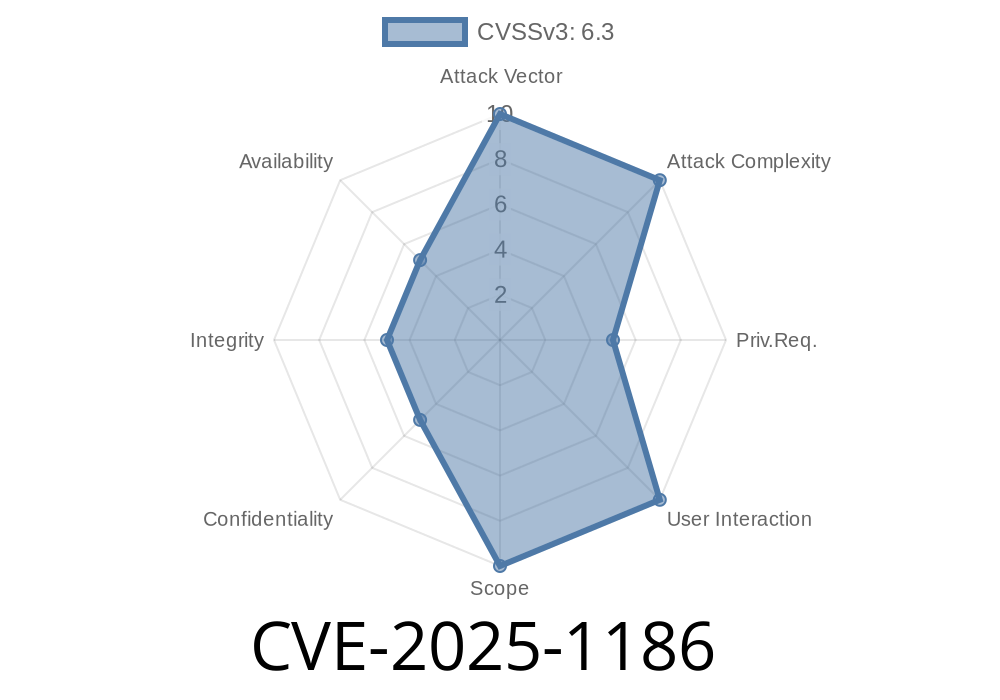A new critical security flaw, CVE-2025-1186, has been found in *XunRuiCMS*, an open-source content management system widely used in the Chinese web development community. According to public reports and our research, all versions up to 4.6.4 are affected.
This post will explain the vulnerability, walk you through the exploit, provide *code snippets*, and offer resources for further reading. If you manage a XunRuiCMS site, updating or patching ASAP is absolutely necessary.
What is CVE-2025-1186?
CVE-2025-1186 is a critical remote code execution vulnerability caused by unsafe deserialization in the file /Control/Api/Api.php. It can be exploited remotely by an attacker, allowing them to execute arbitrary code on the server.
Severity: Critical (9.8/10)
Which Part is Vulnerable?
The flaw is tied to the insecure way the backend handles requests to the /Control/Api/Api.php script, specifically through the *thumb* argument. The application passes data from that argument straight into a deserialization function—*without validation*.
Vulnerable code snippet (from /Control/Api/Api.php)
if (isset($_REQUEST['thumb'])) {
// Unsafe way to process the 'thumb' input
$thumb = unserialize($_REQUEST['thumb']);
}
What's wrong?
unserialize() is a dangerous PHP function if user input isn’t sanitized. This allows a classic *PHP Object Injection* attack.
How Can It Be Attacked?
Anyone on the internet can craft a POST or GET request to the affected endpoint with malicious data in the *thumb* parameter.
Proof-of-Concept Exploit
Let's say an attacker wants to run *phpinfo()* on your server.
1. Build a malicious PHP object (payload)
The attacker first finds or creates a PHP class with a magic function like __destruct() or __wakeup() that runs code upon deserialization.
2. Serialize this object (example)
Suppose XunRuiCMS has a class FileHandler with a __destruct() method that deletes a file given a filename property.
The attacker could serialize an object like
O:11:"FileHandler":1:{s:8:"filename";s:12:"/var/www/ownfile";}
3. Send the payload via request
curl -X POST "http://target-site/Control/Api/Api.php"; \
--data-urlencode "thumb=O:11:\"FileHandler\":1:{s:8:\"filename\";s:12:\"/tmp/evidence\";}"
If the class exists and the CMS loads it, this could trigger code execution, arbitrary file deletes, or much worse—*remote command execution* (RCE)—depending on what classes are available in the environment.
Note: Real exploitation often requires knowledge of the application codebase to identify "gadget chains", but in open source software these are readily available.
Mitigation & Fix
Status:
As of the last update, there is no official patch for XunRuiCMS 4.6.4 and below. If you use this CMS, do the following immediately:
1. Block direct access: Restrict or disable access to /Control/Api/Api.php in your web server configuration until patched.
2. Sanitize input: Replace every unserialize($_REQUEST['thumb']) with a safe data operation, like json_decode or at minimum a type check.
3. Patch/Upgrade: Watch official XunRuiCMS releases and apply a patch as soon as one is announced.
References & Resources
- CVE-2025-1186 at NVD
- Gitee: XunRuiCMS Project
- Exploit Disclosure Post (in Chinese)
- A Guide to PHP Unserialization Vulnerabilities (external)
Threat: Remote code execution by sending crafted requests to the *thumb* parameter.
- Mitigation: Disable/patch the endpoint. Upgrade when fix is available. Never unserialize user input.
This is a serious, easy-to-exploit issue. If you run XunRuiCMS, take action now.
If you have more details or a patch to share, please add them in the comments! Stay safe—always validate and sanitize user input, and watch for new CVE advisories.
Timeline
Published on: 02/12/2025 08:15:09 UTC
Last modified on: 02/18/2025 18:15:32 UTC
